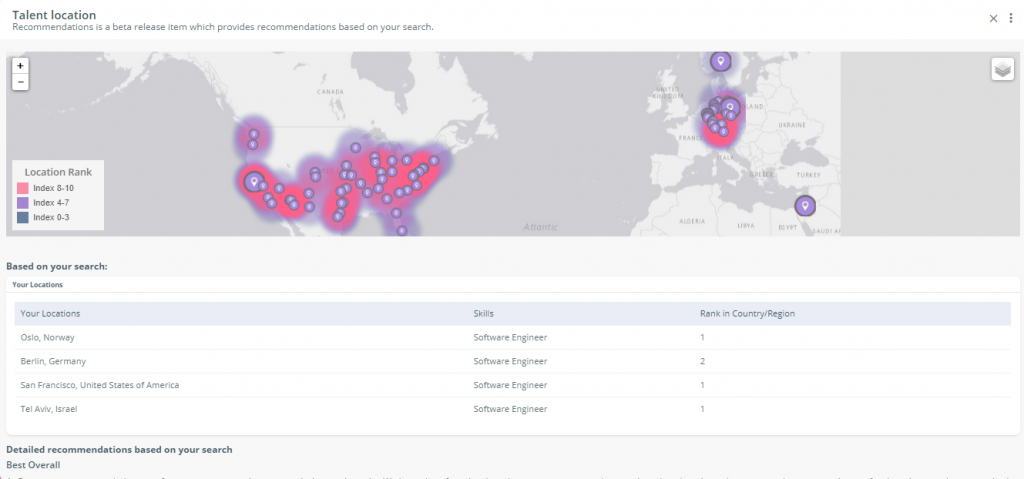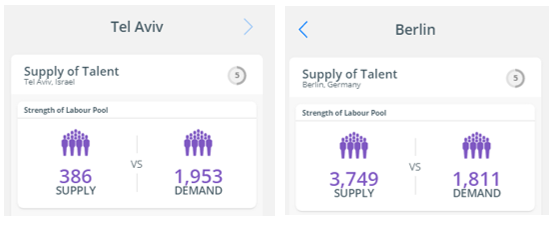‘TALENT RISK’ IS NOW THE BIGGEST INHIBITOR TO BUSINESS GROWTH ACCORDING TO CEOS (KMPG CEO OUTLOOK 2020). IT SURPASSES SUPPLY CHAIN RISK AND EVEN CLIMATE CHANGE AS A CONCERN AT THE TOP. ALTHOUGH TALENT HAS LONG BEEN ON THE CEOS AGENDA, THE LAST 10 MONTHS HAVE PUT PEOPLE AND SKILLS TRULY AT THE HEART OF ORGANISATIONS.
But a disconnect between data on skills, people and locations means businesses are making poor decisions about how and where employees should work, especially in the current climate. From commercial real estate to new market entry, or even market exit, all need a wider view of the market with skills front and centre.
Skills data should not be restricted to an internal analysis of the capability gap. A combination of talent intelligence, business intelligence and strategic workforce planning is powerful and yet underutilised.
As we embark on a new year, with some big decisions to be made, why and how should we put skills at the heart of decision making?
Why should we think skills-first?
The skills market has changed dramatically. For health, wealth and preservation reasons, employees will question how, where and why they work for their employers. Pair this with the huge surge in digital transformation and we have a skills market that has rapidly evolved over even the last year. Many organisations have skills gaps that they don’t know how to fill.
If you want to understand your skills supply proactively, you need to understand your capability gap and how to address the gap. This needs to be a continuous process, with an external focus and it involves more than just looking at roles and locations. There are two main areas to consider when looking at skills supply and demand, they are; workforce and workplace.
Workforce is the availability of skills you need now and in the future. Not just who and where, but the supply to demand ratio of skills. ‘Hot spots’ and ‘not spots’ for skills have an impact on how much you have to pay for talent. Pair salary data and competition for skills with the cost of commercial real estate, the implications of HR legislation in your shortlisted locations to give you an overall cost of talent per seat. Who are you are competing with for talent? Will a location impact on your time to hire or availability to grow the business? Both allow you to calculate the cost of lost productivity days if you can’t hire the talent you need.
Skills also have a connection to workplace. Workplace is looking at risk, economic impact, economic health of country or city, plus factors like; broadband, infrastructure, and transportation links. These factors impact the quality of life and availability of talent and cannot be excluded from decision making.
How do we join the dots between skills and business strategy?
The key to connecting skills to business strategy is to join the dots. Check out our interactive graphic here to explore how the answers to big business issues are connected. To work through an example, I’ll use our big data platform Stratigens to look for skills based on a broad range of factors.
Let’s imagine a business is embarking on a digital transformation programme. They’ll need a steady pipeline of engineering talent for their current and future plans. They already know they don’t have the right skills in house. They decide to look at software engineers as a new talent pool which they haven’t explored before. In which of their locations will they be able to successfully hire them? Will they be remote or office-based workers? Where is the richest supply of these skills?
As a start, the team looks at some of the top known locations for software engineers including; Oslo, Norway; Berlin, Germany; San Francisco, USA and Tel Aviv, Israel. Using Stratigens they look at the overall skills supply and demand. Which are the talent hotspots?

In some locations demands outstrips supply, in other locations it’s the reverse:

Other factors affect decision making too. From competior activity (that is competitors for talent not business), to commercial property prices, quality of life, accessibility, suitability for remote working, talent flow out of universities, amongst many others. Stratigens pulls this data together to make a recommendation on the best location. Plus, the platforms intelligent AI means it can suggest alternative locations based on your criteria and desired skills.
In this example, Munich, New York and Seattle are all flagged as hotspots for software engineering skills. These are talent pools that would have likely been overlooked without accessing skills data. Organisations tend to revert to looking in the spots where they already have physical offices if they don’t have this broad view.
Stratigens helps you understand where the skills are that you are trying to attract, and who else is hiring them. It prevents organisations from making poor decisions as well as saving time and cost to hire. More importantly, it brings this together all in one place. It pulls skills at the centre of strategic decision making. It gives HR leaders proof points to open and inform the conversation. It joins the dots.
Big external data can change the way we answer our internal questions. That data can connect the dots between strategy, location, business continuity and skills. I found that I was still challenging businesses on why they made strategic decisions based on internal analytics and gut feel and not on skills and big data. It turns out it’s because they just didn’t have access to the right information.
Why should we pick one location for a new office over another? Should we be looking at an office based, remote or hybrid operating model? If we need to consolidate, where should we keep a presence based on the availability of talent? What are other organisations doing about the gender pay gap? Who might our competitors for talent be in future?
Accessing this data was expensive, piecemeal, and static and often delivered through expensive, time consuming consultancy projects.
It is business intelligence that joins the dots. We are changing the way that business leaders make decisions by combining and presenting credible data from almost 1400 data sources. If you want to join the dots regardless of your structure, if you want HR to be at the heart of the business if you want to put skills at the centre of decision making and if you want to make evidence- based HR reality – you need Stratigens.




